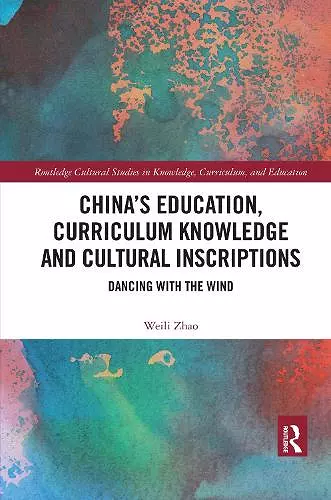China’s Education, Curriculum Knowledge and Cultural Inscriptions
Dancing with The Wind
Format:Paperback
Publisher:Taylor & Francis Ltd
Published:14th Aug '20
Currently unavailable, and unfortunately no date known when it will be back
This paperback is available in another edition too:
- Hardback£145.00(9780415787543)

With a focus on the role of discourse and language in education, this book examines China’s educational reform from an original perspective that avoids mapping on Westernized educational sensibilities to a Chinese environment. Zhao untangles the tradition-modernity division expressed in China’s educational language about the body and teacher-student difference. Exploring the historical and cultural implications of the ways China’s schooling is talked about and acted upon, Zhao argues that Chinese notion "wind" (feng) is a defining aspect of Chinese teaching and learning. Incorporating Western and Chinese literature, this book explores the language of education, curriculum, and knowledge on a cross-cultural landscape and as cultural inscriptions.
‘Dancing with The Wind’ is a far-sighted effort to transgress the dominant western epistemic lens through which the Chinese educational project is being constructed in research work. Without reverting to comfortable or essentialist narratives of the Chinese ‘other’, it locates educational reform in that country within a global space but delicately draws out the ways in which it is the embodiment of difference, using that to historicize the curriculum and schooling but in ways that disrupt our attempts to settle upon comfortable portraits and problematics. Written with humility and grace, it is an invitation to unlearn, and thus a powerful corrective to contemporary comparative research on China.
-- Stephen Carney, Associate Professor in Comparative Education, Roskilde University, Denmark
Zhao’s "Dancing with 'The Wind'" provides an important and intellectually creative contribution to the fields of curriculum, comparative and educational studies. The text provides a unique, novel and intellectually challenging approach for culturally and historically understanding the assumptions and implications of schooling. The analyses of the Chinese character of "wind’ is combined with other Chinese characters to bring into focus a cultural and linguistic terrain of the educational body that engages yet disengages Westernized modes of thought and the construction of difference. The book makes possible a way of thinking about the theoretical difficulties of comparison and offers a style of study for understanding difference. Its style engages in the self and other without the diminishing of either.
-- Professor Thomas Popkewitz, University of Wisconsin-Madison, USA
"This is an erudite, elegant and sophisticated analysis of more-than-China and more-than-the-West. Contesting education, curriculum, knowledge, history, and being, Z
ISBN: 9780367589226
Dimensions: unknown
Weight: 312g
190 pages